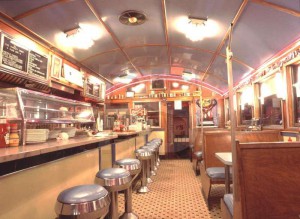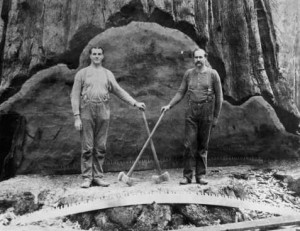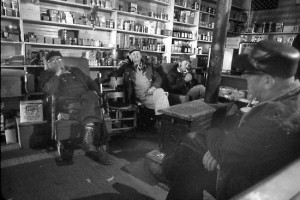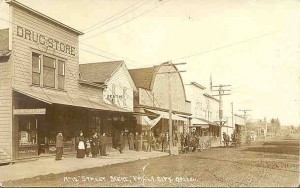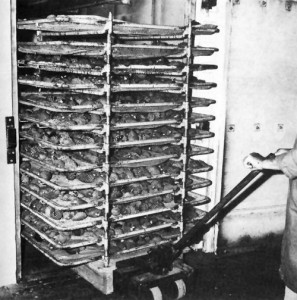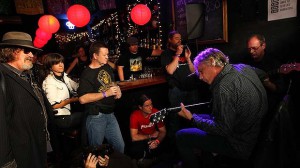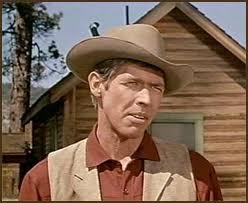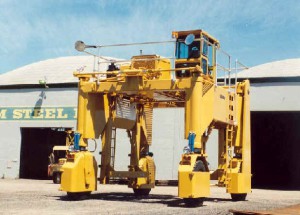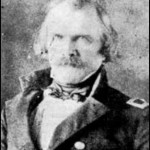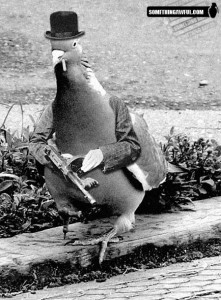I’ve been devoting a lot of thought, of late, to the myriad-stranded, convoluted web that is my employment history. As I pointed out last summer, the job at Small Egg Roll turned out to be the worst—and by far the most disappointing—of all of them, which is especially disheartening in the respect that it was the one job among all of them for which I actually had considerable aptitude and interest, and for which I was best qualified. In most instances, that wasn’t so much the case.
Reflecting on the “early days” of my nascent career as an adult, I can summon to mind several dubious instances of on-the-job experience, which subsequently afforded me very little in the way of applicable real world skills. What has happened to the call for fir cone dryer workers, for God’s sake?
Yes. Fir cone dryers. For eons of millenia the job of drying fir cones was left to the sun—always the most efficient at such chores, what with having nothing better to do than burn for billions of years and all. A heat source is, of course, at the core of any drying operation worth its seed.
But then mankind came along. And, as has long been known, mankind is always in a hurry—in a hurry to make the sun burn faster, hotter, longer, stronger, and with better air circulation. Thus the fir cone dryer was born. What would be the necessity of drying a fir cone in the first place you might very well ask?
There was a time when there was no cloning. I know that is very difficult for some to conceive. But it’s true. There was no cloning. Well, technically, Nature has been cloning all along, but for this particular postulate we need to leave things like the sun and Nature out of the equation. It is Man’s endless quest to duplicate these natural devices that have led Humankind to invent important apparatuses to duplicate Nature’s weaponry, just in case we destroy the original model. Hey, it’s happened!
It was probably going on before he came along, but you can blame Gifford Pinchot for implementing the concept of reforestation on a National forest level. Reforestation allowed the big timber companies to feel okay about clear cutting every last stick of original growth timber in the country. It’s okay folks, we’re replanting! It’ll all be replaced. We’ll plant little babies around the stumps of the great giants we cut down. What a system!
So, back in the days before there were clones, seeds were required in order to propagate the species. In the summer, fir trees produce fruit in the form of cones, which bear inside of them the seeds for creating little baby trees. As the cones mature, some will open while on the tree, allowing their seeds to fly upon the breeze, to land where we know not.
But, as is often the case in life unfortunately, other cones fall from the tree unopened, as yet still fettered full with the seed which they are mandated to scatter. So, down they go, whereupon the sun will continue the process it began when the cone was still attached to the tree. The sun will gently heat the fallen fir cone so that, eventually, after not long at all in sun time, the cone will dry and open, and the seeds will fall out onto the forest floor. Many creatures of the wild (squirrels and rats especially, I might point out) consider fir seeds to be something of a delicacy. But, as these things go in nature, some seeds remain behind to sprout into seedlings and eventually grow into significant bodies of wood.
Such a process, of course, requires a great deal of time by our standards. According to the rings on the trees we’ve cut down, it can take hundreds of years for one to get monstrously huge. Here again, while hundreds of years doesn’t mean shit to a tree, humans are an impatient lot and they want everything yesterday, including their trees and the seeds required to get the ball rolling on fulfilling that desire. Fellas, we need a fir cone dryer!
Now I came to the fir cone game through the back door. Sally and I had recently quit school and moved to Dallas, Oregon ten miles and a world away from the comparative collegial world, which lay in the Monmouth and Independence vicinity to the east. We chose to move to Dallas, I guess, to find new opportunities, though what opportunities those might have been were apparently not particularly well defined, as I don’t remember. It is the Polk county seat, so potentially there was some allure in that fact, though I doubt it. That doesn’t seem our speed.
Well, we did move out of the house in Independence because, as a newly founded couple, we felt the need to strike out upon our own—leaving behind my college roommates Tom and Doug—to forge in the smithy of our souls the uncreated conscience of our relationship. So, that and the fact that—as was customary in a household with Tom, Doug and me in it—there were at least three (actually five, I believe) dogs and an indeterminable number of cats, in that specific instance, jammed into a little two-bedroom bungalo. So, I suppose the motivation may have been weighted toward Sally’s perspective. It was a long time ago. We relocated.
We moved into a sad little dollhouse in Dallas, which was fine, as we had no belongings to put in it anyway. It wasn’t like we required spacious quarters. I believe the biggest bone of contention (as it were) was that the backyard was fenced, in order to corral Spider and Gypsy, who were wont to roam when given the opportunity. They were themselves a young couple, wild in their ways.
The place was on Southwest 10th Street between Birch and Cherry on the hill overlooking Fairview Avenue by the A&W at the western edge of town. I’m not sure what we did for money at first. I believe rent was $85 a month and bills amounted to about $25, so we cobbled that together from leftover student loan money, I would imagine. Allen moved in for a time into the cubby-hole room in the converted attic, second-story plywood affair. I’m sure we charged him a princely sum to maintain those luxurious quarters. We were merciless.
I don’t think it took very long before it became apparent that a job or two might be required somewhere along the line. My only previous job experience was a mostly failed experiment in the construction trade the summer following my senior year in high school. The only benefit that came of that experience was the fact that it could be noted on subsequent job applications. More about construction adventures another time.
At first we tried “picking” filberts (hazelnuts) at an extensive orchard out toward Pedee. That’s a terrific job if you like to be bent over in the autumn dew rooting through fallen leaves for the husk-y little suckers like a truffle snuffer. I think we made like two or three dollars in four hours or so, before it started raining so hard that we quit for the day. We never went back there again, I assure you.
Sometime not long after that, Sally found a job at a little restaurant on the other side of town at the Country Kitchen (everything out there is named “Country” something. Hell they ARE out in the country and they are mighty damn hickily proud of the whole damn deal). The place was about the size of a double wide with similar ambience, if you were to fill it with a counter and three or four booths, thirty smelly guys and a palpable layer of cigarette smoke.
I think the only job requirement was to get the orders right and to battle the indefatigable, degenerate advances of the horde of misfit and misbegotten males, relentlessly bent on converting trees into some unrecognizable form. Sally was capable of contending with that sort of bullshit without a lot of undue duress, therefore the job was hers and one aspect of her personality was in its element. She held court.
She worked the morning shift at the Country Kitchen, four-thirty to two in the afternoon, serving greasy breakfasts and bestowing endless cups of coffee to loggers preparing to ride the crummy out to the woods of the nearby Pacific Coast range to denude any remaining pristine patches of forest. No sooner was that clan gone, around six, than the guys who worked at the Willamette Industries mill at the south end of town would trundle in. They’d leave around seven-thirty and all the construction crews would show up, seeking fortification before they headed out to their various job sites. It was a regular eco-system. The fellers, the planers, and the builders. Nothing left but saw dust and fir cones.
Oh yeah, fir cones. So Sally had her finger on the local employment pulse at the Country Kitchen. She knew too of my limited job history, lack of any real proficiencies, and my incredible phobia for losing digits and/or appendages—a fear that in the community of Dallas was widely scorned and ridiculed by the likes of Lucky, Lefty, Stumpy and Three-Finger Bill. However, despite her diligent efforts, Sally was unable to immediately generate any satisfactory leads for my narrow occupational skill set. Still, I persevered.
Through a friend (one of like ten guys named Mike I knew back then) who lived out in the tiny coast range timber dimlet of Falls City, I had occasionally found labor (the term “work” seems so formal), picking Douglas fir cones. Commensurate with my resume, it was a low expectation job, to be sure, one that in many ways bore a distinct resemblance to filbert picking, an occupation for which I had demonstrated some limited capacity, though that was perhaps coupled with a distinct lack of ambition and enthusiasm.
The job responsibilities of a fir cone picker were few. One was encouraged to fill a burlap sack with the things, picked up from the ground by the novice, or expertly plucked from the boughs above by veteran fir cone pickers, such as my friend, Mike. Were one to successfully fill a bag with fir cones—which, while similar to filling a bag with filbert clusters, was considerably easier and less time-consuming to accomplish—an opportunity was thus created for the prospect of fair recompense for the effort. There was the reasonable expectation to get paid a couple of bucks for a filled sack at the fir cone dryer loading dock.
Soon I was scaling forty or fifty feet up young fir trees, climbing to the upper limbs where the cones were easy picking. Filling several sacks with cones was easily accomplished up there, especially if one didn’t mind heights. Among my other disinclinations in life, heights ranks chief among them, just behind loss of limbs. However, Mike taught me how to ride the outer boughs, gently sliding down on the furthest limbs from the top of the tree to the ground, assuaging to a great degree my apprehensions in regard to gravity, as encountered from a lofty perch among the firs.
That endeavor went well, as far as it went. But I longed for stability, a future. I longed for permanence. I longed for warmth. Winter was approaching. As it so happened, one day while delivering our load of sacks to the fir cone dryer dock, where we got weighed up and paid. Wild Bill, the boss man of the entire dryer operation, made it generally known that they were hiring. Eureka! I didn’t need to be told twice. It was under cover from the rain. It was warm. It required very little extended effort and even less consistent thought. There was a lot of down time, passed in countless intoxicating ways.
Not long after I was hired, Allen got hooked up working there too, most likely of his own initiative. It wasn’t like I had any pull with Wild Bill or anything. The fir cone dryer lay fixed upon a rolling hill, about a mile out of town on the Kings Valley Highway. It looked like an old, weathered barn—which may very well have been one of its former incarnations. I never asked.
Most likely it was always some sort of dryer. There are plum orchards abounding in that green region of the mid-Willamette Valley. Lots of cherries. Filberts too, of course. All might require a dryer in some instances. I can’t imagine that a fir cone dryer differs very much from something like a prune dryer, the process and preferred outcome being essentially the same.
The design of the structure thoughtfully utilized the lay of the land. The dryer itself was a segmented wooden shaft enclosed inside a two-story barn. The shaft was about twelve feet wide—divided by two partitions that formed three compartments—and it was six feet high. It descended from the top story to the lower, twenty-five feet in length, at a gradual declining gradient. At the bottom, an oil furnace was mounted in a smaller structure abutted to one side of the barn, with massive air ducts leading into the shaft.
Just off the “highway” at the front, there was a small gravel parking lot. The loading dock and storage area adjoined the building on the town side. There was a cramped office with a door out to the dock and a door opposite that opened into to the work area at the top end of the dryer. Beneath the window between the office and the exterior entry doorway at the other side of the barn, sacks of cones were stacked and served as an impromptu row of seats.
Rookies primarily tended to remain in that vicinity. That’s where you learned the ropes. The demands of the position were few. Those there were involved some occasional moderate exertion and plenty of waiting around—which I was pretty good at, as occupations go.
The action portion of the day was spent cutting open the twine-sewn burlap sacks of (usually) wet cones and distributing them upon the drying screens. Once the cones were evenly spread upon those trays, a guy would feed each one down into one of the dryer via slots at the sides of the each compartment wall. Five screens could be slid down per slot, and the slots were spaced about a eighteen inches apart, horizontally—so that the hot air of the furnace could circulate among the cones. Altogether there were three chutes twenty-five feet long, with four planes of five trays. A lot of cones! Forty or fifty sacks at a crack.
Typically it took the better part of a couple of hours for two guys to perform the task. One guy would cut open the sacks with a curved knife, dumping the cones on a screen. The other guy would spread them out evenly, and then slide the trays down the shafts.
Each row had to be addressed from top to bottom, as extending too far laterally on any one level would create certain future regretful acrobatics in trying to slide the other segments of screens into place. It was hot work. Even in the chilly, wet late fall, the place was toasty—and fragrant. It always smelled of musty balsamic forest and Christmastime around there.
It could take up to four hours for the cones to bake sufficiently enough for them to open and drop their seed to the floor of the drying shaft. It was a hiatus during which “work,” such as we knew it, would come to a complete halt and “break time” would ensue.
Around six-thirty the early birds would arrive to convene the Royal Order of the Fir Cone Dryer Friars social club for yet another evening of merriment. Most came packing a bottle of something stiff or at least a six-pack. Several guys would show up with guitars. Rick. Mike (another Mike) played guitar. So did Allen. Me too. So did Lee.
Lee was a wistful wisp of a man, prematurely old, with a jaunty black moustache and a permanent five-day growth of salt and pepper stubble scattered on a gaunt, hollow-haunted visage. He had a sweet, pudgy, wife with glowing roseate skin, who was very plain; and two cherubic blue-eyed young daughters. The four of them lived in a small, ramshackle yellow rental on Ellendale Loop at the far outskirts of town.
Whenever I read Carlos Castaneda books, I would always picture Lee in the role of Don Juan. He was a restless lonesome wind, sonambulently ambling the dryer premeses like a persistently distracted ghost. I was never absolutely sure of his position there. I thought he might be some sort of watchman—as we worked the swing shift, from four to midnight, and probably needed security—though I can’t imagine what for. Maybe he performed some other function in the grand scheme of things, I don’t know. He just wandered around.
Allen remembers Wild Bill looking like Lee Marvin. I remember him to resemble a red-faced Patrick Dennehy. He probably looked like James Coburn. He was in his late thirties, broad, with sandy graying hair and a certain larger than life quality. We agree that his chief feature was that he popped open a can of Oly at any available opportunity—which was most of the time. Wild Bill served as host when the festivities would get under way. Eventually he would head out to his pickup and down a succession of beers, blankly gazing out the windshield while listening to Charlie Rich and Donna Fargo on the radio.
The Social Club served as a refuge for old-timers and misfits—castoffs from the slowly dying timber industry. With few forests left to fell, or logs left to mill into boards and beams, work had become scarce. It was true they were hiring at the Caterpillar plant and Towmotor. Those two operations pretty much kept Dallas and much of Polk County alive. But most of the Clubbers were too decrepit or inept to be retrained for a position so sophisticated as D2 bulldozer assembly or the manufacture of lift carriers.
Many of the old farts would come by just to get away from the little woman bedeviling them at home and to get a snoot full without her knowing about it. The younger guys turned up to hang out (as well at the dryer as anywhere else in Dallas), get a free buzz on and jam. It was pretty much a nightly affair.
Bucky and his crew of two from down below, didn’t participate in playing music. They’d come up at break and pretty much keep to themselves. They sat bunched together on a row of sacks along the side wall next to the office, chain-smoking cigarettes, staring vacantly into space. Bucky was in his early 30s, round-faced, effusive curly blond hair stuffed under a dirty black Greek fisherman’s hat. He was a typical country clyde, nice enough guy, with a ferrety face and big, wide, buck teeth. He maintained and operated the furnace and oversaw his seed sacking crew of two down at the bottom of the shaft.
So we’d sit around for the better part of four hours getting smashed and playing guitars. There might be as many as twenty guys sitting around doing nothing—although only seven of us were getting paid to do so. Allen was by far the best guitarist. Allen always was the best guitarist in any situation, under any conditions. Mike played with a sort of bluesy, Dead-y, country flair indigenous to the region at the time. I’ve always been pretty much of a strummer, rhythm guitar guy.
Rick was a rhythm guitarist too, but he had a voice that was as big and husky as he was. He was blind in one eye and it had a tendency to wander, so that sometimes its gaze might follow you around while he was looking in a completely different direction. It was often quite unnerving, especially if you had never before witnessed the phenomenon.
I would guess that it was that eye (or the general regional malaise) that prevented Rick from meeting with great success. He wrote wonderful songs. The lyrics were typically meaningless, but the words always sounded very nice together. In most cases something about his “old lady.” “My old lady has green eyes, as green as emeralds in the sea.” I’ll never forget that one.
So, anyway, when he came around. Rick was the song guy. He could get something “formal” going, like a real song with actual structure that everyone could more or less play together on—rather than each of us just showing off the licks we knew in endless jams. But, after a few drinks, even those pointless jams got very interesting.
Lee had a very unique guitar style. He wasn’t a good player at all. And he was rather shy as a performer. But he had a distinctive manner of playing that I had never heard before, nor have I since. I would say that it had its roots in Travis Picking (think “Wildwood Flower”), or whatever style it was before Merle Travis popularized it—a certain bluegrass feel—with vague, Arkansasian overtones.
Allen says the music Lee played sounded like Hank Williams retreads. I don’t remember it that way at all. Whatever Lee was up to, his guitar playing was very unique and he probably employed the same technique that Hank Williams and Merle Travis heard and imitated when they began to create their own music. It preceded them. It was an old, rural style that probably doesn’t even exist anymore. I remember his music fondly. Or, perhaps more accurately: I remember being quite fond of Lee’s music.
Eventually, the cones would actually dry and we would have to go back to work. I don’t even slightly recall what my tasks were at that point in the procedure. It’s all a sloshy, dim blue memory. I faintly recall the guys from below sweeping the seeds down the chute with wide push brooms (or maybe that was us from the top). But before that could happen, all the de-seeded cones needed to be dumped from the screens into bags that would eventually go to the bark dust facility, wherever that was. And the trays needed to be collected and placed back on the hand truck up at the top of the shaft. I have no idea how that happened.
 The job at the fir cone dryer didn’t last long—maybe six months. I remember my last night there Bucky didn’t show up. Bucky never didn’t show up. He was always there. He was the most paycheck-motivated character I’ve ever known. But the night before he had tried to drive back home drunk from Salem and he got in a wreck out on Highway 22 near Rickreal. The other driver was killed and Bucky ended up doing seven years in prison for vehicular manslaughter.
The job at the fir cone dryer didn’t last long—maybe six months. I remember my last night there Bucky didn’t show up. Bucky never didn’t show up. He was always there. He was the most paycheck-motivated character I’ve ever known. But the night before he had tried to drive back home drunk from Salem and he got in a wreck out on Highway 22 near Rickreal. The other driver was killed and Bucky ended up doing seven years in prison for vehicular manslaughter.
When spring came, Allen took off to go live with Juanita in Monmouth. Sally and I moved out of the house on 10th about ten blocks east to the cool, old two-story house on the corner of Clay and Hayter. Tom and Terri moved in to the lower half of the dwelling and it wasn’t long after that Tom and I got jobs doing construction with Mike (yes, a different Mike). Those Days of the Golden Homes were a story unto themselves.
********************************************************************************************************************
Well, the past year has been full of chaos and turmoil and I’m hoping for things to settle for a while so I can get some work done. I re-edited Unreal Gods last winter and took out three chapters. So now it’s under 600 pages, at least. I think I’m pretty much the only one to read the new version. I think three people (including me) have read the original. The hell with trying to get editors to read the damn thing, I can’t even get my friends to read it. Which brings us to our next installment of biblical haiku.
The Bible VII
Matthew, Luke and Mark
Had an argument with John
The pissed apostle.






